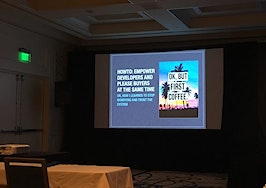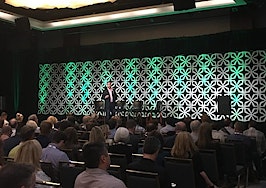SAN FRANCISCO — “Find the pain point.” That’s how the objection experts — Beverly Ruffner,
Jeremy Katz and Carey Condy — told the audience to manage their objection strategy at the objection battle on stage at Inman Connect San Francisco.
Ruffner, Katz and Condy responded to both buyer and seller objections from the moderators (Jeff Lobb and Laura Monroe). Here’s how they’d handle these toughies.
‘Will you promote my house with a print ad in The Wall Street Journal? But why not?’
Condy opened her objection “handler” with a question about digital marketing: “Did you know that 95 percent of all homebuyers begin their search on the internet?”
“This is the year we’re using both print and digital advertising,” she added. “One minute of video advertising equals 1.8 million words, in effect, so we will do some print ads — but we want to be strategic about what we do.”
Katz jumped in, too: “Do you want print advertising because you expect a lot of buyers for this property? They may spend more money on your house, and that’s a good point, but at the same point you can also appreciate that since we’ve been in the business for 17 years, we have the buyers in our database already.
“Would you see any benefit in selecting an agent who already has the buyers who want to buy your home?” he finished.
‘I know you want to show me homes, but why do I need to sign a broker’s agreement?’
“We’d never ask you to sign anything that had no benefit to you,” said Katz. “But it sounds like you might have a concern.
“If there was a benefit to signing it and working with an agent, would you do it?” he added. “Do you only want to look at places that are active on the market, or do you want to see all of them? Including ones that tried to sell or didn’t, or maybe the for sale by owner [FSBO], or pocket listings.
“We don’t want to lock you into anything; we can cancel it if we’re not getting along or something doesn’t work out, but I want to open up all the homes possible to you. The agreement means that I understand that you commit to working with me to find you a home, and I’m going to owe you work and respect.”
But Ruffner took home the objection trophy this round with just a couple of sentences: “Either party can cancel a contract,” she pointed out. “I might not like working with you.”
‘We’re not sure we really want to buy now, but we want to look at what’s available.’
Ruffner opened this response with some education. “Just going through your expectations and whether it would make sense to think about moving now or if it’s something you could do later on down the road might be a good thing to do,” she began.
“Why are you thinking about making a move? Do you definitely have to sell your home to make a purchase? If you are selling in a hot market, you’ll make more for your house, but you’ll also have to pay more for a house. The most important thing is to have as much education about the market as you possibly can to be able to make an educated decision,” she concluded.
Katz picked up on the “buyers'” concerns about the market and prices. “It sounds like you’re concerned about finances and that prices may go down,” he started. “That’s a valid concern, and most of the folks I’m working with are going to use a loan. Given low interest rates, in the end, is it really more about the overall price of the home, or is it mostly about the monthly payment?”
‘Why is your price so far off the Zestimate?’
“The price is your decision,” explained Condy. “My job is to provide expertise on what the market is doing. I’m taking comps on what is selling in your market. In many, many neighborhoods — and in the neighborhood we live in — Zillow is not an accurate barometer of value.
“We can start with price where you want to start, but this is what I’m going to ask of you: The market is very efficient, and the market will speak. If we find that in two weeks we’re not getting the showings and activity we want, I’m going to want to come and sit down with you and have a pricing conversation. Can we agree to that?”
Katz added his .02 cents: “I understand where you’re coming from — like most clients, you want to get the most money for your home, and I totally respect that.
“Homes that linger on the market tend to take less,” he added. “What would be the risk if we put it out there for that kind of price and you don’t get the response you’re looking for? And what’s the risk of pricing it too low?
“You don’t need to accept even a full-price offer. I would like to establish a range value that would get showings,” he wrapped up. “My question for you is more about the pricing strategy. We can figure out what people will think and then decide if you want to start with a comparatively low number and drive it up through a bidding war. Or do you want to start with a high number?”
(“Bidding war” were the magic words.)
‘I staged my home, redid the landscaping — so if you bring in a buyer, can I just pay you 3 percent?’
Ruffner responded to this FSBO objector with some reconnaissance. “How long have you been on the market, and how many people have you shown the home to? Are you happy with that, or do you think you should probably be getting more traffic?
“We need everybody to see that staging — so, yes, absolutely you can pay me 3 percent, but what I would really love to do for you is showcase your home because we want to get the buyers to see your home.”
And ultimately, this objecting “couple” had an issue with 3 percent of what sale price? “You’re not selling your home, and 3 percent of zero is zero,” she said.
Katz brought out the big guns from the very beginning. “Why is it you’re willing to pay me to negotiate against you and not negotiate for you?” he asked.
“It sounds like you’re willing to pay half a commission, and like most folks, you’d like to save money, and that’s why you’ve decided to sell it yourself. You’re probably among the few who might actually succeed, so I commend you for that,” he added. “But my concern for you lies in the fact that you might succeed. Are you aware that on average, FSBOs sell for between 6 percent and 10 percent less than the average agent sale in this market?
“Is it about how much you’re saving or how much you’re keeping? Folks who hire me see the value, and I never ask them to pay a commission that doesn’t make sense.”
Boom!















